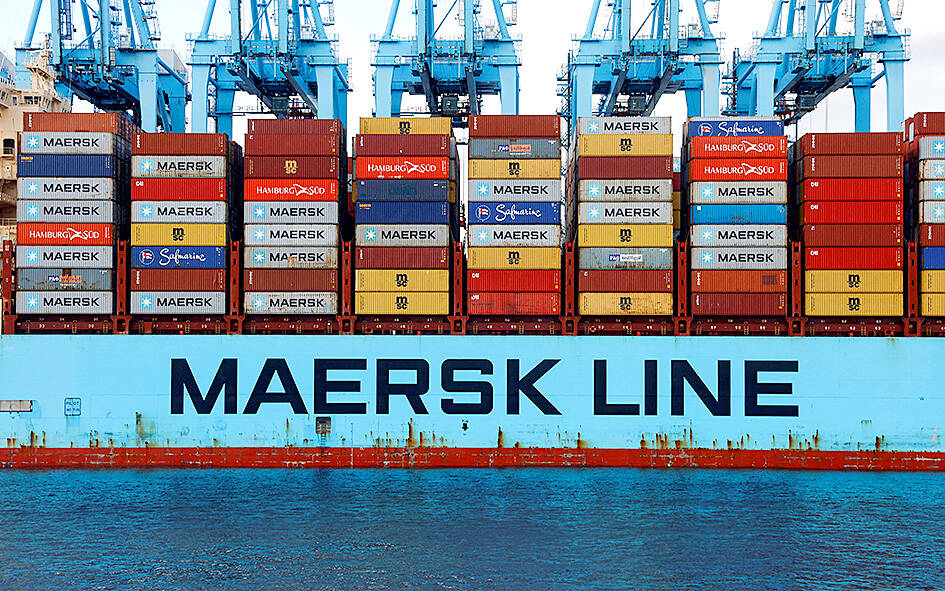Shipping and logistics group A.P. Moller-Maersk A/S has agreed to sell its two logistics sites in Russia to IG Finance Development Ltd, it said yesterday, nearly marking the end of its business activities in the country.
The group said the sale of its inland depot facility in Novorossiisk, with a capacity of 1,500 containers, and a chilled and frozen warehouse in Saint Petersburg had obtained regulatory approvals in the EU and Russia.
“We are pleased to have found a new owner of our two logistics sites in Russia and thereby execute on our decision to divest all our assets in the country,” Maersk chief commercial officer Karsten Kildahl said in a statement.

Photo: Reuters
IG Finance Development, a company registered in Cyprus, has made an agreement with Arosa, a large food importer in Russia, to operate the sites, Maersk said.
The group still needs to sell four tug boats under its Svitzer brand, a process that is ongoing, a spokesperson said.
After that, Maersk would not have any business in Russia.
In August last year, Maersk sold a 30.75 percent stake in Russian port operator Global Ports Investments to Russia’s largest container operator Delo Group.

Zhang Yazhou was sitting in the passenger seat of her Tesla Model 3 when she said she heard her father’s panicked voice: The brakes do not work. Approaching a red light, her father swerved around two cars before plowing into a sport utility vehicle and a sedan, and crashing into a large concrete barrier. Stunned, Zhang gazed at the deflating airbag in front of her. She could never have imagined what was to come: Tesla Inc sued her for defamation for complaining publicly about the vehicles brakes — and won. A Chinese court ordered Zhang to pay more than US$23,000 in

Taiwan Semiconductor Manufacturing Co (TSMC, 台積電) yesterday held its first board of directors meeting in the US, at which it did not unveil any new US investments despite mounting tariff threats from US President Donald Trump. Trump has threatened to impose 100 percent tariffs on Taiwan-made chips, prompting market speculation that TSMC might consider boosting its chip capacity in the US or ramping up production of advanced chips such as those using a 2-nanometer technology process at its Arizona fabs ahead of schedule. Speculation also swirled that the chipmaker might consider building its own advanced packaging capacity in the US as part

‘NO DISRUPTION’: A US trade association said that it was ready to work with the US administration to streamline the program’s requirements and achieve shared goals The White House is seeking to renegotiate US CHIPS and Science Act awards and has signaled delays to some upcoming semiconductor disbursements, two sources familiar with the matter told reporters. The people, along with a third source, said that the new US administration is reviewing the projects awarded under the 2022 law, meant to boost US domestic semiconductor output with US$39 billion in subsidies. Washington plans to renegotiate some of the deals after assessing and changing current requirements, the sources said. The extent of the possible changes and how they would affect agreements already finalized was not immediately clear. It was not known

Taiwan Semiconductor Manufacturing Co (TSMC, 台積電) yesterday said that its investment plan in Arizona is going according to schedule, following a local media report claiming that the company is planning to break ground on its third wafer fab in the US in June. In a statement, TSMC said it does not comment on market speculation, but that its investments in Arizona are proceeding well. TSMC is investing more than US$65 billion in Arizona to build three advanced wafer fabs. The first one has started production using the 4-nanometer (nm) process, while the second one would start mass production using the